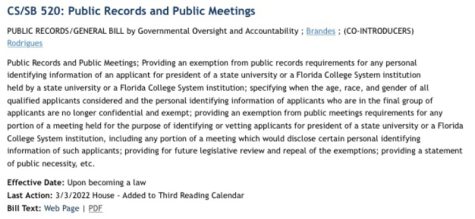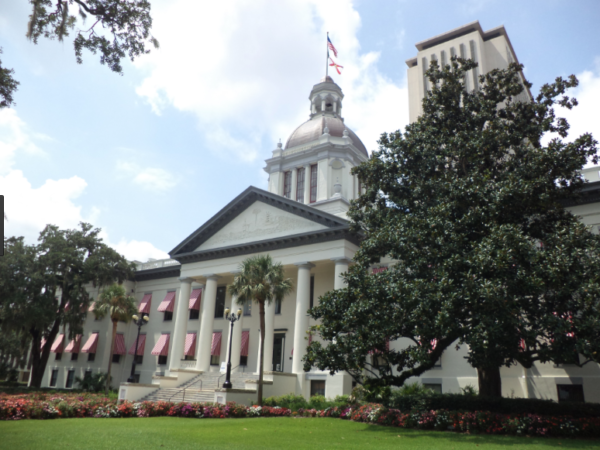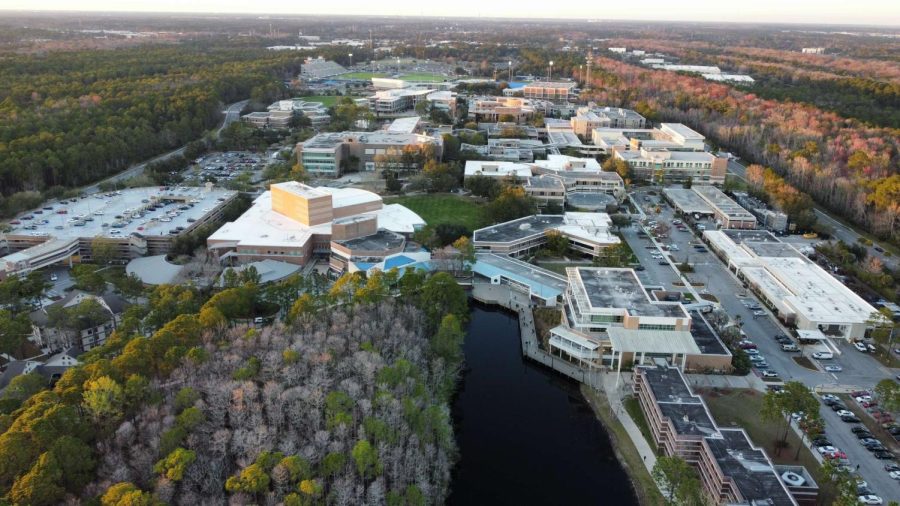Florida Senate Bill (SB) 520 is currently in review by the House and, if passed, could impact the future of collegiate presidential searches by keeping the list of applicants off public record until the end of the process.
As it stands, the names of every person who applies for the role of university president in Florida state colleges are public records. The bill, sponsored by Rep. Senator Jeff Brandes, aims to make the list of applicants private until the school’s search committee chooses at least three final candidates.

The concept behind this bill is that it will attract additional applicants because people who want to apply won’t face any penalty from their current employer for applying to a new job.
Critics say making the names of applicants private could bring corruption into the selection process because the public wouldn’t know who was turned down for the role.
“This is not a transparent process today,” said Senator Brandes. Brandes explained that universities often hire headhunting firms to bring in serious candidates, and the firms usually don’t accept applications they won’t seriously consider.
“The way Florida public records law works, the applicant’s names were made available publicly essentially as soon as they applied. That created a problem where their top-tier applicants were not willing to apply unless they were guaranteed a spot in the finalist position,” Brandes explained.
If the bill passes, universities will have to select at least three final candidates for the position. The names of these candidates must be made public for at least 21 days before the committee can elect a president who the governor will approve.

Student Body President Selma Besirevic is on UNF’s presidential search committee and explained that their meetings are currently open to the public.
“My concern with that [SB 520] is I don’t like how it’s closed off. It should be open,” Besirevic said, noting that access to the meetings could change if the bill becomes law.
Besirevic went on to say that she sees both sides to the argument over the bill because applicants could jeopardize their current jobs if employers see that they’re interested in a different role.
Since the bill requires universities to make the final candidates public for a minimum of 21 days, the public will have a chance to sit in on final meetings and voice their concerns. Schools like UNF also hold open forums before the application process begins so the public can provide input to what they want from a university president.
Brandes believes the bill will increase the public’s ability to participate in the selection process because of the minimum 21 day period.
Besirvic made it clear she doesn’t have a stance on whether the bill is good or bad. “I think having it open allows it to be more ethical and more subject to being seen by the public… they do deserve to know, but then again, the applicants are also concerned.”
SB 520 will require that a demographic survey of all the applicants be taken and made publicly available. The list of qualifications for president will also stay public.
“When you have headhunting firms telling people we’re not even asking you to apply unless you’re guaranteed to be a finalist, that’s not sunshine,” said Brandes, referring to Florida’s Sunshine Laws. “This bill aims to ensure that we get the broadest pool of candidates applying to Florida’s great universities and colleges.”
This bill will not affect UNF’s presidential search process because the applicants are already public record. Multiple UNF professors declined to comment on the bill, saying they did not know enough to discuss it.
___
For more information or news tips, or if you see an error in this story or have any compliments or concerns, contact editor@unfspinnaker.com.
















